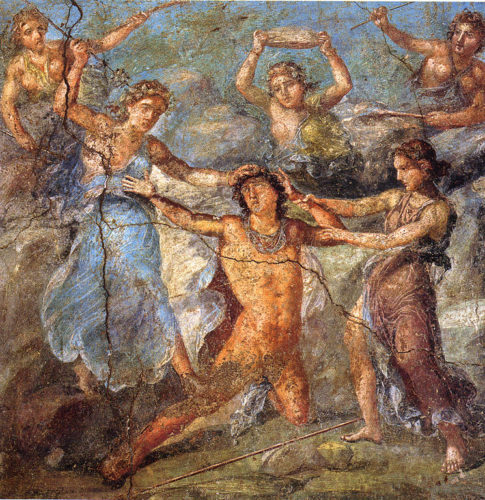At the keynote address of the recent National Earthquake Conference in Long Beach, the director of the Southern California Earthquake Center, Thomas Jordan, warned that the southern San Andreas Fault is long overdue for a large earthquake. And in 2013, the Uniform California Earthquake Rupture Forecast estimated “a greater than 99 percent probability of a magnitude 6.7 or greater earthquake in the next 30 years in the state as a whole.” I’ve written before about ongoing crises such as California’s drought and the inevitable consequences of the American delusions of progress and white supremacy.

Wounded Bear of California Atop Burning San Francisco, 1907. Public domain.
Drought, especially, is a crisis characterized not by a singular event, but rather by an ongoing “non-event” (Cohen 72-73). Furthermore, the longer a drought lasts, the greater the emotional anxiety generated about when it will finally end. An earthquake, on the other hand, is a singular catastrophe. However, just like a drought, the longer we go without experiencing a major earthquake, the more pressing the question of when “the big one” will hit becomes.
In Euripides’ tragedy Bakkhai (Βάκχαι), King Pentheus of Thebes unsuccessfully attempts to ban Dionysos’ cult. Dionysos, impersonating his own priest, is brought before Pentheus, who orders him imprisoned. Dionysos then summons an earthquake to destroy Pentheus’ palace. “So much for trying to put me in jail,” he comments wryly (36).
In a recent ritual I participated in, Dionysos possessed a medium and warned that the earth is going to split open soon, and the dead are going to rise…literally, not metaphorically. He said that ceremonies will need to be performed for the dead bodies that are exhumed by earthquakes, and that people will need to take care of their communities.
Ironically, in San Francisco, already famous for its destruction in the 1906 earthquake, cremations and cemetery burials were banned in the period between 1902-1910 and “families were forced to transfer their beloved’s remains elsewhere,” leaving only the Columbarium to house the dead. But San Francisco’s historical eviction of the dead, coupled with its contemporary evictions of the living, will not save the city from Dionysos’ prophecy.
Though Dionysos stressed that the rising of the dead will be literal rather than metaphorical, there is always a metaphorical dimension as well. In the words of Tupac Shakur:
The ground is gonna open up and swallow the evil. That’s how I see it, my word is bond. I see—and the ground is the symbol for the poor people, the poor people is gonna open up this whole world and swallow up the rich people. Cause the rich people gonna be so fat, they gonna be so appetizing, you know what I’m saying, wealthy, appetizing. The poor gonna be so poor and hungry, you know what I’m saying it’s gonna be like… there might be some cannibalism out this mutha, they might eat the rich.

Judgement (XX), Rider Waite deck. Public domain.
Through his medium, Dionysos pointed out that the dead are cannibals, for they are fed by the blood of the living soaking into the earth. Nor did he forbear to offer his own unique social commentary, raging that corruption hides in order and pretends to be good because it’s orderly…but that doesn’t make it lawful. “We’re sick of that shit.” Things are going to change, things are going to get torn apart. The same theme is present in the initial exchange between Dionysos and Pentheus in Bakkhai, where the god scorns the double standards Pentheus applies to corruption:
Pentheus: And are your mysteries performed at night or in the day?
Dionysos: Mostly at night. Darkness is serious.
Pentheus: Yes it is, seriously corrupting, for women.
Dionysos: Can’t corruption [αἰσχρόν] be found in daylight too? (30)
San Francisco is no stranger to corruption masquerading as order in broad daylight. On May 19, a San Francisco police sergeant shot and killed an unarmed 27-year-old black woman, SFPD’s third fatal shooting of a person of color in six months. In the last year, SFPD has seen not one but two scandals over racist and homophobic text messages exchanged between officers, convictions for corruption, investigations of rape, and video evidence of systemic anti-black racial profiling. The 2014 police shooting of security guard Alejandro Nieto, falsely accused of being a “gang member” by the so-called “user experience design professional” Evan Snow, has been labelled “death by gentrification.” Tensions between tech workers and the homeless have led to the destruction of homeless encampments, “leaving, still unanswered, the question of how to truly get rid of tent settlements that keep popping up in the city.” In the wake of the most recent shooting, the police chief has been deposed, but the problems run much deeper than one man.
San Francisco’s systemic corruptions, long known to their survivors, have been exposed for all to see in recent months. There is a word for this process. The English word “apocalypse” is derived from Greek apokalyptein (ἀποκάλυτειν) meaning “uncover, disclose, reveal,” from the prefix apo- “from” plus kalyptein “to cover, conceal.” An apocalypse is an uncovering. An apocalypse is an initiation on a massive scale.
“The whole world is going to go through initiations,” Dionysos said through his medium. The destruction of the twin towers was an initiation, an old sacrifice, not necessarily feeding things that we might want fed, but feeding them nonetheless.
“Why is initiation important?” he asked. Answering his own question, he told us “you only stay in your mother’s womb for a bit, the rest of the growing happens outside.” The first initiation any of us undergo is birth, coming into the world screaming.

Antigone, Sébastien Norblin, 1825. Public domain.
The second is naming. Dionysos scorned the replacement of traditional naming ceremonies by government-issued birth certificates, noting that the newborn is thereby made known to the government, but not properly introduced to the spirits and gods. In ancient Athens, for example, every Athenian man was presented to the familial organization known as the phratria in front of the shrines of Apollo Patroos (Ancestral) and Zeus Herkeios (Of the Enclosure) by his father at age three and again as an ephebos; a newly-wed husband would also bring his bride before the altars of his phratria (Burkert 255).
The Athenian tragedians understood well the precedence of the laws of the gods over the laws of men. Sophocles’s Antigone, for example, centers on this conflict. Several generations after the events of Bakkhai, King Kreon of Thebes attempts to forbid his niece Antigone from carrying out the religious obligation of burying her brother Polyneices.
Antigone famously defies Kreon, appealing to the laws of the gods:
It was not Zeus who made this proclamation;
nor was it Justice dwelling with the gods below
who set in place such laws as these for humankind;
nor did I think your proclamations had such strength
that, mortal as you are, you could outrun those laws
that are the gods’, unwritten and unshakable.
Their laws are not for now or yesterday, but live
forever; no one knows when first they came to light.
I was not going to pay the gods just penalty
for breaking these, dreading the purposes of a
mere man. (lines 450-460)
In Bakkhai, the conflict of Dionysos and Pentheus highlights the same theme:
Pentheus: And hand over that stupid thyrsos.
Dionysos: Take it yourself. It belongs to Dionysos.
Pentheus: Then I’ll put you in jail.
Dionysos: The god will let me out. (30)

Pentheus, Casa dei Vettii, Pompei. Public Domain.
After Dionysos destroys Pentheus’ palace with earthquake and frees himself from imprisonment, he convinces Pentheus to dress as a maenad and spy on the Theban women worshiping Dionysos in the mountains. The women, led by Pentheus’ own mother Agave, discover him and tear him to pieces with their hands. Agave brings her son’s severed head back to Thebes, under the delusion that it is the head of a lion she has slain.
Thus, in his own way, Pentheus is initiated into the mysteries he sought first to suppress and then to surveil. The chorus of Dionysos’ Lydian followers exclaim: “born of a snake/dressed as a woman/he took up a thyrsos and followed a bull directly down to Hades./For the thyrsos is certain death!”
According to Plutarch’s Life of Crassus, when Crassus, the Roman general who suppressed the slave revolt of Spartacus, was killed fighting the Parthians, his head was used as a prop for Pentheus’ head in a performance of Bakkhai (33.2-4). Whether this story actually happened or not, it is noteworthy that Plutarch says of Spartacus, “when he was first brought to Rome to be sold, a serpent was seen coiled about his face as he slept, and his wife, who was of the same tribe as Spartacus, a prophetess, and subject to visitations of the Dionysiac frenzy, declared it the sign of a great and formidable power” (8.3).
Spartacus’s wife is described as a Dionysiac prophetess, and Crassus’ head ends up as a double for Pentheus’. Classicist Page DuBois notes, “Dionysos is present here in these moments of rebellion and vengeance” (29). From his recent words, delivered through a possessed medium, the same appears to be true today. And the state of affairs in California, both geological and social, make his prophecies nearly inevitable. Ιω Βάκχε!
Bibliography
- Burkert, Walter. Greek Religion. Cambridge: Harvard University Press, 1985
- Cohen, Paul. History in Three Keys: The Boxers as Event, Experience, and Myth. New York: Columbia University Press, 1997.
- DuBois, Page. Out of Athens: The New Ancient Greeks. Cambridge: Harvard University Press, 2010.
- Euripides. Bakkhai. Translated by Anne Carson. London: Oberon Books, 2015.
- Sophocles. Antigone. Translated by Ruby Blondell. Newburyport: Focus Classical Library, 2002.
* * *
This column was made possible by the generous underwriting donation from Hecate Demeter, writer, ecofeminist, witch and Priestess of the Great Mother Earth,
The Wild Hunt is not responsible for links to external content.
To join a conversation on this post:
Visit our The Wild Hunt subreddit! Point your favorite browser to https://www.reddit.com/r/The_Wild_Hunt_News/, then click “JOIN”. Make sure to click the bell, too, to be notified of new articles posted to our subreddit.
Great article! This is the first time I have heard these stories, but yet I completely agree. I am still told by the masses that I’m crazy. I just maintain that I’m not in denial is all.
Plate techtonics could not care less about human behavior. Myths occur after the fact, not before it for a reason.
Earthquakes are definitely going to happen whether humans exist or not. It’s their effects on human societies that I’m interested in, and that’s where myth and prophecy are useful. As in Evans-Pritchard’s study of the Azande, myth doesn’t explain the mechanics of plate tectonics, but it provides interpretations of timing and circumstance…and not necessarily always after the fact, especially if you know that a coming event is definitely going to happen. The plates have been building tension for centuries and the earthquake is inevitable, but the precise moment of release is variable enough to be influenced by the gods. But more importantly, even if the timing is entirely random, the higher humans build, the harder their towers are going to fall. What goes up must come down.
Incidentally, there are human-induced earthquakes (see http://earthquake.usgs.gov/research/induced/ and http://www.msnbc.com/the-last-word/oklahoma-earthquakes-linked-fracking-study), though that’s not what is going on with the San Andreas Fault.
Pingback: The Wild Hunt: Dionysos | Heathen Chinese
Really enjoyed this. None of what you say surprises me, I lived in northern California for years but you connected all the threads beautifully. The Dionysus speaking through your medium sounds like the Dionysus a friend of mine gets in his work and you seem to understand his true nature very well.
Thank you very much. Dionysos is obviously a very complex god, so I would never claim to understand his *entire* true nature, but we did have a very strong medium as well as a very dedicated and pious priest of Dionysos in the room.
Anne Carson, whose translation of the Bakkhai I used in this article, prefaced her translation with a poem. These lines especially speak to both his nature and the limitations of human understanding of his nature: “Dionysos does not explain or regret anything. He is pleased if he can cause you to perform, despite your plan, despite your politics, despite your neuroses, despite even your Dionysian theories of self, something quite previous, the desire before the desire, the lick of beginning to know you don’t know. If life is a stage, that is the show. Exit Dionysos.”
Thank you for the poem. II’s interesting that I could substiture “my cats” for Dionysus in her lines and it would be a very accurate description of the spirit I live with every day. This calls for a glass of wine.
These are frightening words. Are there any actions you and your ritual group have to decided to undertake based on what Dionysos has said? I feel the act of sharing his words along with your interpretation is certainly of value.
Sharing his words is certainly one thing I’ve been trying to do.
Dionysos advised at least one participant in the ritual to make sure that their phone trees are in place, and to divine on who to trust in what role in the event of natural disaster and emergency. Performing ceremonies for the dead was his other practical suggestion, I guess. He also stressed the importance of the mediums-in-training in our community getting more hands-on experience.
Quite interesting to me born n Compton,CA. in LA county and having lived through a number of earthquake. I have one of the first books published on the San Francisco Earthquake in 1906, and note it was the fire afterward that did far more damage than the Earthquake.
Interesting the hear of Dionysos, mentioned in relationship to Earthquakes, both in Ancient times, and in recent times through his medium. This was a another very interesting article and I am impressed with your growing range of subjects and traditions that you report on.
Dionysos
Dionysos
Dionysos
Thanks!
I won’t believe in a literal zombie apocalypse unless I see it, but it’s interesting how much this symbol is front and center in the zeitgeist right now.
I didn’t get the sense that He was talking about physical revenants walking about, necessarily, but rather the unearthing of bodies and the spiritual consequences thereof. But prophecy is always, by nature, open to interpretation. And He said that we’ll “know when it happens.”